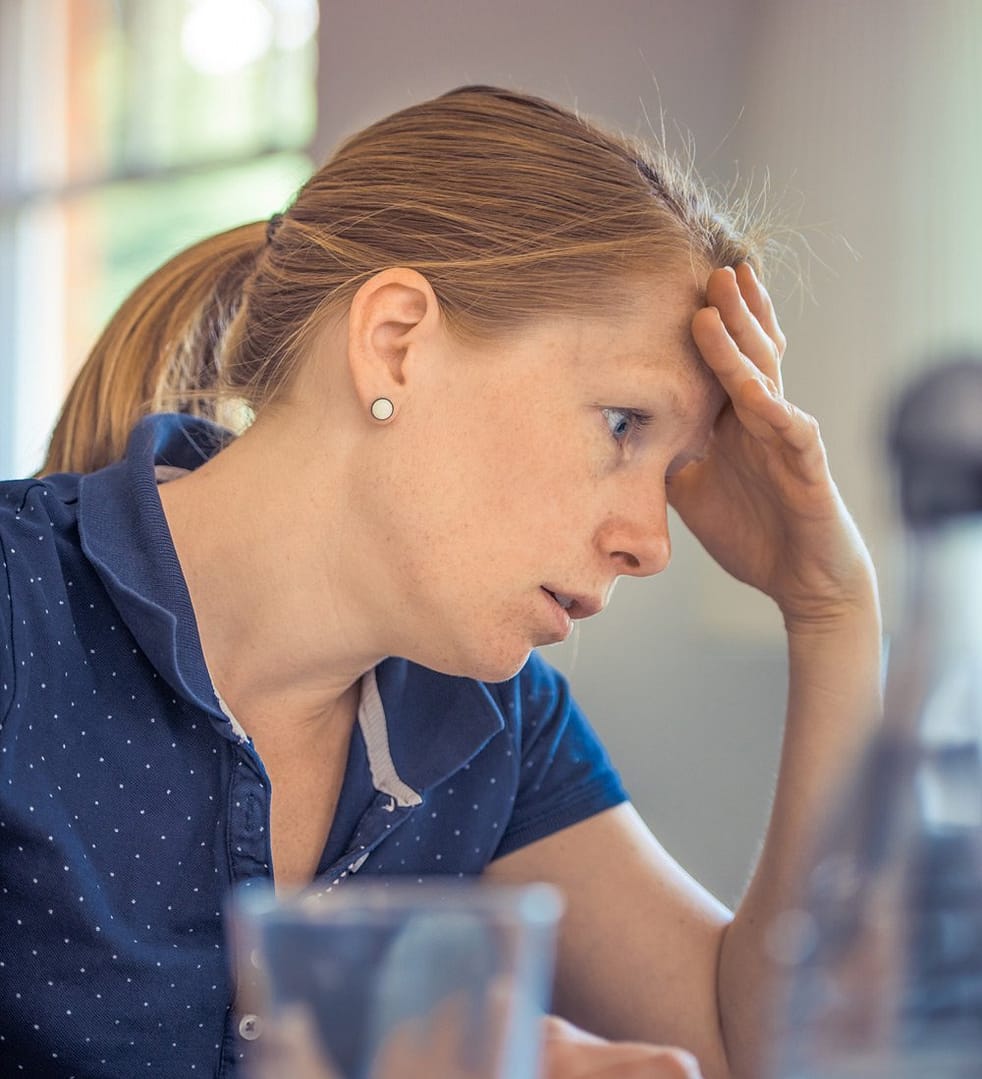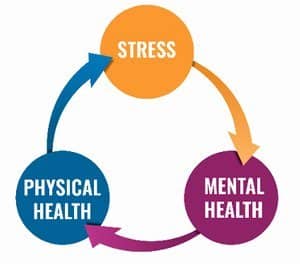Although this content specifically talks about managing your anxieties around coronavirus and the easing of lockdown as this is currently a really relevant topic. The tips and strategies are also extremely useful in managing your day to day anxieties, which I know from personal experience can be so debilitating.
The main symptom of anxiety is over worrying about different activities and events. Things may feel out of your control. This is particularly true if you have anxieties around coronavirus. You feel worried a lot of the time if you have anxiety. You might feel ‘on edge’ and alert to your surroundings.
This can affect your day-to-day life, not just in the current challenging times, but also as things gradually get back to normal. You might find that it affects your ability to work, travel places, leave the house or socialise. You might also get tired easily or have trouble sleeping or concentrating. Maybe you’ll have physical symptoms, such as muscle tension and sweating.
These are not just issues linked to coronavirus and lockdown but can and do impact our lives on a regular basis irrespective of what is happening right now. For many, the easing of lockdown has highlighted how difficult it is living with anxiety. But covid will not be around forever. The following information will really help anyone who is struggling with their anxieties. They will help you to become calmer and respond to your anxious thoughts in a healthier way.
Have you felt more anxious lately?
As lockdown has been ongoing for some time, those of us that deal with anxiety on a daily basis have gradually begun to become used to living our lives in this way. We have become somewhat accustomed to the effect that it is has had on our former, daily routines.
For many of us this has led to a slower pace of life and a reduction in our anxieties. This is particularly true if we have social anxiety. It could be said that the impact of coronavirus and subsequent lockdown brought about a welcome relief and escape for those that that were facing numerous anxiety inducing situations. We were having to deal with the stress that all of these situations created.
So, for many, lockdown brought numerous worries and a fear of feeling trapped. But for those with anxiety it brought about relief. We were able to cocoon ourselves away from the world, safe in the knowledge that we were able to stay safe at home. We were not having to engage in the previous activities we found stressful and anxiety inducing. Life became more tolerable.
Ironically, that can create more problems later on as lockdown is lifted. We have become so used to our safe environment that our anxiety is heightened leaving us more anxious than ever before.
The outbreak of coronavirus left many of us feeling unsettled and there are a lot of different ways that people can experience post-lockdown anxiety.
The following might be signs you’re experiencing post-lockdown anxiety:
- feeling worried or stressed about the future
- difficulty sleeping
- feeling tired, irritable or having trouble concentrating
- racing heart (palpitations)
- stomach cramps
- shortness of breath or breathing quickly
- sweating
What the stats say…
The UK’s leading user-led anxiety charity, Anxiety UK, has reported the prospect of lifting or easing of coronavirus restrictions had led to an increase in their anxiety for almost 67% of the 745 Anxiety UK members who took the survey.
According to those who undertook the survey, using public transport (49.3%), going out in public spaces (47.5%), going shopping (45.9%), returning to work or education (45.8%) and attending large, social events (45.6%) were the next five most feared activities given by respondents.
Additionally, 54.4% reported that they had become used to being at home and worried about how they will cope with getting back to their pre-restrictions routine. (Anxiety UK May 2020)
It is then clear that for many they have become comfortable with the safety of their home environment. This is changing to some extent. You might now be thinking and worrying about what comes next.
After being inside for such a long time, for those without anxiety it is naturally going to feel strange trying to get back into what is now a different routine. Socially distancing, new routines at work, wearing masks, queuing for the shops, and not being able to see all of your friends at the same time. It is quite normal for people to have some anxiety about this new way of living.
However, for those with pre existing anxiety disorders, this new way of life could heighten their anxiety and make life even harder.
So if this is you, what are the best ways you can cope with this situation.
9 Tips for Managing and Overcoming Coronavirus Anxiety
So, now that we understand why we are experiencing these fears, how can we begin to overcome worries about coronavirus and post lockdown anxiety? See what works for you!
Understand your triggers.
One important tip is to explore what triggers your anxiety. Is it going back to work? Crowded spaces? Wearing masks? Going back into shops? The key to overcoming your anxiety is to understand what sorts of situations trigger your anxiety in the first place, Then find ways to practice these situations accordingly.
Ultimately, anxiety cannot be rationalised—you can’t explain to someone why they shouldn’t be feeling anxious. However, you can become numb to the effects of the anxiety via gradual exposure which desensitises you to its triggers.
Face your fear.
Then, once you’ve understood your triggers you can make a point to confront your fears. Avoiding anxiety inducing situations perpetuates the fear. Face your fears isn’t just a cliched slice of advice. It actually works. Start small and build yourself up. If you have anxiety around shops, start by going somewhere more local. Then work your way up. Remind yourself that you can do difficult things. Think about the last time you did something that was really hard. How did you do it? What helped? Pull from those resources to help you face your fears.
Stop Feeding the Anxiety
It’s tough out there. But don’t feed the beast with media.
Turn off the 24-hour news cycle that endlessly repeats information about coronavirus that you could gather in 10 minutes. The news shows the scariest facts and videos available. They then supplement this with panels of talking heads making predictions about things that are unknown, or partaking in redundant discussions. Remember that there’s a news business, all competing for ads and monitoring us for cues, such as anxiety. They know how to pitch their headlines and stories. Let it go. Keep your viewing time limited and try to do it in only one place, so the rest of your living space can be for work, pleasure, and relaxation.
On the Internet and on social media feeds, try to ignore endless data, panicky posts, and posts about conspiracies that only agitate. Right now, try to focus more narrowly on anything about coronavirus that offers practical advice about physical and psychological health. Only look for crucial data that can help you calculate your own personal response to local circumstances.
Look for reliable sources that report national and world news in 20 minutes or less. Pay attention to local news to stay abreast of public health advisories. Try to quickly gather the information you need and then turn your attention elsewhere. Definitely spare your children the horror of the endless TV depictions of the hot spots and projections about the number of deaths.
Practice visualisation exercises.
Also, try envisioning yourself excelling in social situations. This will help you to feel confident going into real social interactions. Use visualisation exercises regularly. See yourself in social situations having fun, chatting with others, and feeling good in your body. Visualisation is very powerful and will help you feel more confident because you have trained your brain to feel like it has already been in the situation many times successfully.
Write down your thoughts.
Try writing down your thoughts to overcome anxiety. Writing down your thoughts as they come up is a great way to look at them with some perspective. With perspective, you’ll probably find that most of what’s making you anxious falls into one of two categories. Either they’re things that won’t actually happen, or they’re things you have no control over. Get in the habit of writing down what’s making you anxious and, in your head, labelling these feelings as ‘anxious.’ It will give you the perspective you need to dismiss rather than obey your anxiety.
Vent to a friend who won’t judge you
If you’re more of a talker than a writer, it can help to confide in a friend about how you’re feeling. Talk to someone who won’t judge you for the way you feel. But, try to avoid talking to someone who will fuel your anxiety even further. The key is choosing someone who understands how you feel but won’t perpetuate the fear you see online.
You should also first ask whoever you speak to if it’s okay to share your fears with them. Many of us are coping with the stress of what is going on. It’s only fair to ask someone if they are willing and able to listen before dropping your stress on them.
Prepare positive corrective experiences.
Outlining a plan for success is also an effective way to overcome anxiety. The key to overcoming anxiety is having positive corrective experiences. The best way to approach this is by identifying small steps toward target behaviour so one can gain a sense of mastery over the feared stimulus. For example, when dealing with social anxiety, if one is fearful of meeting new people because they don’t know what to say, a person can create a list outlining steps to eventually introducing themselves to someone new. A sample plan might be: First make eye contact with someone, then once comfortable doing that, wave at someone, then say ‘hi’ and so on.
Breathe!
It might sound obvious to say breathe. We all need to do it! However, a particular breathing style can really alleviate stress and anxiety. If practiced regularly can reduce your anxiety symptoms significantly.
In this simple, powerful technique, you take long, slow, deep breaths (also known as abdominal or belly breathing).
Try deliberately slowing down your breathing. Count to 4 as you breathe in slowly – then count to 6 as you breathe out slowly. As you breathe, you gently disengage your mind from distracting thoughts and sensations. Focus on the act of breathing. Breath focus can be especially helpful for people who feel their anxieties becoming too overwhelming. It calms you and centres your thoughts on something you can control. Practice this technique on a daily basis, even when you’re not anxious and it will become part of your routine.
However, this technique may not be appropriate for those with health problems that make breathing difficult, such as respiratory ailments or heart failure. If this is the case, please seek advice from your GP first.
Consider exposure therapy.
Finally, consider exposure therapy, which is proven to help individuals overcome social anxiety (and other forms of anxiety for that matter). One of the best ways to tackle social anxiety is through exposure therapy. This approach allows you to gradually introduce yourself to feared situations while learning how to process them with a decreased level of fear and anxiety. It’s best to try this approach with a trained professional who will begin by creating a fear hierarchy with you. This allows you to organise your feared situations and approach them in a more productive way.
I do hope you found this blog post useful, particularly as we come out of lockdown but still have anxiety around the impact of coronavirus.
If having read this article you still feel you would like some support around the issues of coronavirus and the easing of lockdown then do get in touch and I will be able to help you. Simply contact me here.
It might simply be a chat over the phone or maybe some more comprehensive work to help you manage and cope with your anxiety.
Either way, if you feel you would like to talk it through do get in touch and we can have a chat and work out the best way forward for you.






